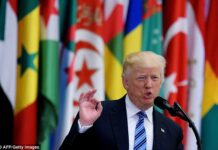Harvard University filed a federal lawsuit on Friday against the Trump administration, challenging its controversial decision to revoke the university’s certification to enroll foreign students. The lawsuit, filed in U.S. District Court in Boston, marks a major escalation in the battle between one of America’s most prestigious academic institutions and the federal government.
The Trump administration, through Homeland Security Secretary Kristi Noem, announced earlier this week that it was terminating Harvard’s Student and Exchange Visitor Program (SEVP) certification beginning with the 2025–2026 academic year. The move effectively blocks more than 7,000 international students from enrolling or continuing their studies at the university.
In its legal complaint, Harvard described the revocation as a “blatant violation” of the U.S. Constitution and federal law. The university said the decision inflicts “immediate and irreparable harm” not only to its students but to its core academic mission.
“With the stroke of a pen, the government has sought to erase a quarter of Harvard’s student body, international students who contribute significantly to the University and its mission,” the lawsuit states. “Without its international students, Harvard is not Harvard.”
The case has been assigned to U.S. District Judge Allison Burroughs, who previously ruled in Harvard’s favor in a high-profile admissions lawsuit in 2019.
University President Alan Garber, in a letter to the Harvard community, said the revocation was a retaliatory act in response to the institution’s refusal to yield to federal pressure. “This action continues a series of government efforts to punish Harvard for our refusal to surrender academic independence and submit to illegal oversight of our curriculum, faculty, and students,” Garber wrote.
Homeland Security Secretary Kristi Noem has justified the decision by accusing Harvard of “fostering violence, antisemitism, and coordinating with the Chinese Communist Party,” allegations the university categorically denies.
White House spokesperson Abigail Jackson dismissed the lawsuit as politically motivated and accused Harvard of ignoring broader national concerns. “If only Harvard cared this much about ending the scourge of anti-American, anti-Semitic, pro-terrorist agitators on their campus, they wouldn’t be in this situation,” Jackson said. “They should focus on creating a safe environment instead of wasting time on frivolous lawsuits.”
The loss of international students could deal a serious financial and academic blow to Harvard, which has long prided itself on being a global hub of education and research. International students make up over 25% of Harvard’s enrollment, and many pay full tuition, contributing significantly to the university’s revenue.
The lawsuit is the latest flashpoint in the Trump administration’s broader campaign to reshape higher education policies, especially at elite institutions that it accuses of promoting liberal ideologies and resisting federal scrutiny.
Legal observers say the case could have wide-reaching implications not just for Harvard, but for academic freedom, university autonomy, and the future of international education in the United States. A ruling in favor of the university could block further enforcement of the revocation and pave the way for a broader legal showdown over the federal government’s power to regulate academic institutions.
Written By Rodney Mbua



















